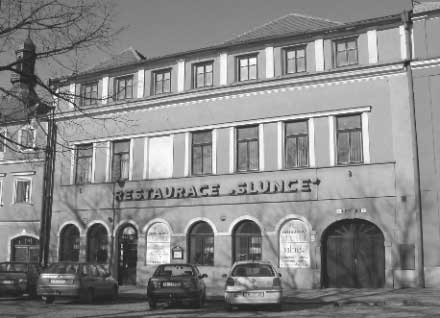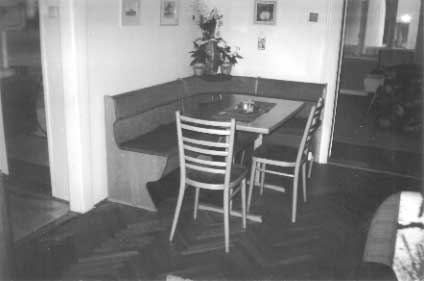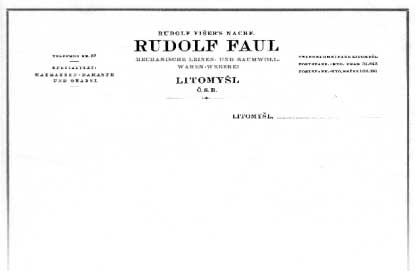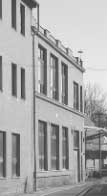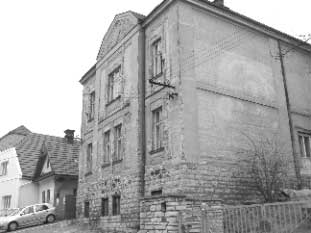
| ▪ back | ||||||||||
The Story of Two Factory Owners |
||||||||||
|
Rudolf Fischer was born on 28th June, 1870. He lived at 21, P. Bezruč Street, where Mr. Patočka´s driving school is today. He was tall and well-built. Mr. Jiráček remembers him after the war as a grey-haired man with dark glasses and a white stick. He always had a revolver in the hip-pocket of his trousers. He might have had a wife but he didn't have any children. Mr. Fischer owned the textile factory at today´s 515, Paratyzánská Street (what is nowadays the headquarters of the KOMFI company). He supplied cloth for firemens' uniforms. He later sold the factory to Rudolf Faul. Fischer´s firm had an outlet in Terst, Italy. Rudolf used to go there by train once a fortnight. He often talked about Italian history, Terst and its surroundings with his friends. He liked going for long walks. Together with the other Litomyšl Jews, he was taken to Pardubice on 3rd December, 1942 and later to Terezín (on Cf 486 transport). Mr. Jiráček told us that when Mr. Fischer visited his parents, he used to remember the times when he had lived in the ghetto and how he had nearly lost his sight. In Terezín, he was in charge of the food supply. During one of the morning line-ups, he reported to the commander that there was no food left, not even a frozen beetroot or a potato. The commander, who was sitting on a horse, got upset and beat him with a whip in the face and he lost 90 per cent of his eyesight. Rudolf Fischer stayed at Terezín until May, 1945. After the war, he used to go to visit the Jiráček family in Benátky, bringing back fresh milk. We think he died in 1955. Tereza Jandáčková and Markéta Zrůbková Rudolf Faul was born on 16th August, 1891. Before the war, he was well-known in Litomyšl. He was small and thin. His short curly hair was starting to turn grey. He had good manners and a pleasant demeanour. He was always elegantly dressed and the creases on his trousers were always perfectly ironed. Despite all this, he was a bachelor. He bought the factory from Rudolf Fischer before 1929, because in that year he had to pay a religious tax 90,- CZK higher that the tax paid by Mr. Fischer. He gradually turned the firm into a really modern weaving mill. Mr. Khon worked as the chief clerk in his company. He stayed at the Slunce Hotel. Mr. Faul lived and behaved like royalty. He never hurried and he never raised his voice. He smoked cigars. Every day, including Christmas Eve, he had lunch and dinner in the Slunce Hotel's restaurant in today's Smetana Square, which was owned by the Kunert family. On Christmas Eve, he used to order fried fish for his dinner. He always went to "dine", not just to "sit in a pub". He only drank wine, never beer or spirits. When Jews were forbidden to go to restaurants, he dined in the Kunerts´ kitchen and they brought him food from the restaurant across the backyard. He had a car - a light brown, six-wheel Chevrolet with two seats. It was a soft-top with a linen roof. Although he could drive, he employed a driver, Adolf Pohl. He was very popular with women and he had a lot of girlfriends in the town. He is said to have been involved in a car accident when he was with one of them. Mr. Rudolf Faul was not sent from Litomyšl to Pardubice and then to Terezín, but the files kept by the Jewish Museum in Prague say that he died on 14th December, 1942 at Auschwitz. Because the dates of death were only recorded in the cases when Jews were arrested by the Gestapo, the rumour may be right that Mr. Faul decided to escape from the Protectorate but that he was caught at the border. His old firm was run by the two Rédr brothers. The firm produced parts for weapons and employed students from the Masaryk Regional Technical School, called "řemenda". When the Germans established a military hospital in their school, the boys started to do forced labour in the factory. Václav Pechanec |
||||||||||
|
